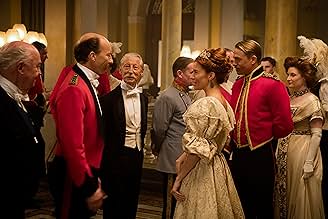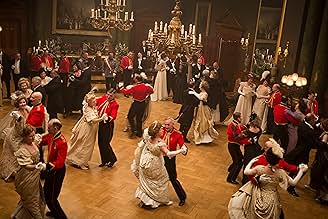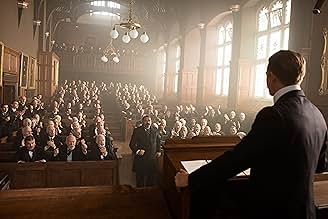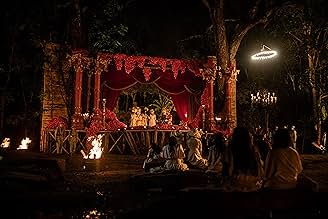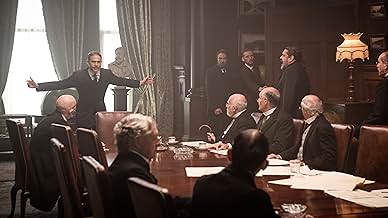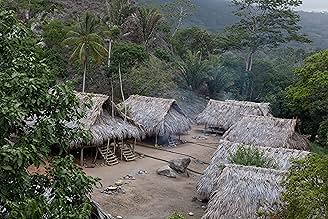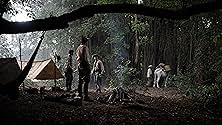Une vraie histoire, qui a pour héros l'explorateur britannique Colonel Percival Fawcett, qui disparait à la recherche d'une ville mystérieuse amazonienne pendant les années vingt.Une vraie histoire, qui a pour héros l'explorateur britannique Colonel Percival Fawcett, qui disparait à la recherche d'une ville mystérieuse amazonienne pendant les années vingt.Une vraie histoire, qui a pour héros l'explorateur britannique Colonel Percival Fawcett, qui disparait à la recherche d'une ville mystérieuse amazonienne pendant les années vingt.
- Prix
- 5 victoires et 31 nominations au total
Avis en vedette
An American biographical adventure; A story about a man who journeys into the Amazon at the dawn of the 20th century aiming for a city he called 'Z' and discovers evidence of a previously unknown, advanced civilization that may have once inhabited the region. It's a film that resembles, in style, exploration film epics of the mid-20th century. Charlie Hunnam gives a well measured performance as the British geographer, Army Major, and explorer Percy Fawcett. The story centres on passion and determination and obsession and escape but also the losses suffered by leaving home - his growing family and dutiful wife - in service of fantastical dreams. It is a biopic by numbers of a troublesome topic because Fawcett's history has many critics. Nonetheless, it is a stately adventure despite the slow pacing.
That the movie succeeds is a credit to Hunnam, who comes of age both literally and figuratively in this movie with a performance of great humility, charm, and grit. A far cry from his breakout role as a motorcycle gang leader, and an even further cry from his awkward performance in Guy Ritchie's unique (and hopefully never-to-be-repeated) view of young King Arthur as a slum thug.
Props to audiences worldwide who are connecting with a 2 hour and 20 minute opus that is as far from the new Transformers attempt as the earth is from the moon. Shows that quality film-making will always find an audience.
Would have been nice if the script were historically accurate but perhaps that is asking too much.
Ironically, because of the internet, the amount of solid new archaeological evidence being released each 24 hours in today's world would be the equivalent of ten years of time in Fawcett's era. In particular, I am referring to the material of late which suggests lost civilizations submerged in both the Atlantic and the Pacific over 12,000 years ago (see Graham Hancock's lectures for more, most free on Youtube) would explain how Brazil, centered between the two, could indeed have hosted a "lost city" which, thousands of years ago, entertained guests from both realms.
Finally -- for hard-core history buffs only -- the written diagrams preserved even today in the Archives of Rio de Janeiro ("Folio #512") which constitute the last known "communication" from the ACTUAL final, ill-fated, Fawcett expedition were discredited because "experts" of the day claimed they contained elements of different language roots, not one root, and hence "must" be fake. However, if indeed the area was a centerpoint between two now-lost civilizations originating in two different oceans, the multiple language roots would be expected and natural, and not an indication of fraud. ((Designated "IMDb Top Reviewer." Please check out my list "167+ Nearly-Perfect Movies (with the occasional Anime or TV miniseries) you can/should see again and again (1932 to the present))
Props to audiences worldwide who are connecting with a 2 hour and 20 minute opus that is as far from the new Transformers attempt as the earth is from the moon. Shows that quality film-making will always find an audience.
Would have been nice if the script were historically accurate but perhaps that is asking too much.
Ironically, because of the internet, the amount of solid new archaeological evidence being released each 24 hours in today's world would be the equivalent of ten years of time in Fawcett's era. In particular, I am referring to the material of late which suggests lost civilizations submerged in both the Atlantic and the Pacific over 12,000 years ago (see Graham Hancock's lectures for more, most free on Youtube) would explain how Brazil, centered between the two, could indeed have hosted a "lost city" which, thousands of years ago, entertained guests from both realms.
Finally -- for hard-core history buffs only -- the written diagrams preserved even today in the Archives of Rio de Janeiro ("Folio #512") which constitute the last known "communication" from the ACTUAL final, ill-fated, Fawcett expedition were discredited because "experts" of the day claimed they contained elements of different language roots, not one root, and hence "must" be fake. However, if indeed the area was a centerpoint between two now-lost civilizations originating in two different oceans, the multiple language roots would be expected and natural, and not an indication of fraud. ((Designated "IMDb Top Reviewer." Please check out my list "167+ Nearly-Perfect Movies (with the occasional Anime or TV miniseries) you can/should see again and again (1932 to the present))
Screenplay jumps from one segment of Fawcett's life to another, without a lot of connexion.
I didn't really object to this film's two and a half hours long run time, I just wish more time would have been spent in the jungles, searching for the lost city, because when they're in the jungles, the film works well, as unseen natives launch arrows at them, and their rocky trip through some rapids, and the film is well worth watching for those scenes. More of the screenstory should have dealt with this, as well as the jungle natives themselves.
Instead, the first fifteen minutes are unrelated hunting stories, and it later veers off into feminist ramblings for one lengthy scene, and a completely out of place, and needless sequence on a WWI battlefield, which seems to occupy about fifteen minutes of the run time as well, and for what purpose? It seems like the filmmakers had abandoned the premise of searching for a lost city, and padded the plot out with these scenes, and as a result, the search for a lost city only makes up about 40% of the movie.
There are occasional questions of whether the explorers are more savage than the natives, but even that doesn't seem to go anywhere, as the film will quickly go off into a different direction.
This is (or should be, anyway) a film where its setting and location should become a character in its own right (like the jungles in Predator, or the building in Die Hard, or the hotel in The Shining) but we see so little of it that it could just simply be an overgrown section of land in Hawai'i.
I didn't really object to this film's two and a half hours long run time, I just wish more time would have been spent in the jungles, searching for the lost city, because when they're in the jungles, the film works well, as unseen natives launch arrows at them, and their rocky trip through some rapids, and the film is well worth watching for those scenes. More of the screenstory should have dealt with this, as well as the jungle natives themselves.
Instead, the first fifteen minutes are unrelated hunting stories, and it later veers off into feminist ramblings for one lengthy scene, and a completely out of place, and needless sequence on a WWI battlefield, which seems to occupy about fifteen minutes of the run time as well, and for what purpose? It seems like the filmmakers had abandoned the premise of searching for a lost city, and padded the plot out with these scenes, and as a result, the search for a lost city only makes up about 40% of the movie.
There are occasional questions of whether the explorers are more savage than the natives, but even that doesn't seem to go anywhere, as the film will quickly go off into a different direction.
This is (or should be, anyway) a film where its setting and location should become a character in its own right (like the jungles in Predator, or the building in Die Hard, or the hotel in The Shining) but we see so little of it that it could just simply be an overgrown section of land in Hawai'i.
Having not known quite what to expect from this movie - had it been made anytime before 30 years ago that might have been easier - I actually found it fascinating, and it held my attention the whole way through. Based on a true story, it paints a vivid picture not only of the Amazonian region which Percy Fawcett and his men set out to explore, but also of the Western society they came from, but in a fairly balanced way - this didn't feel like another case of 'weren't Western white people before 1980 all absolutely dreadful' but rather a portrayal of a society with its own beliefs and attitudes (as all societies have) faced with the prospect of discovering another, much older, civilisation.
This wouldn't be a film for fans of action movies as such. Instead it offers a fascinating study of place, society and the often slow and hazardous process of discovery and its effect on the people - all of the people - involved.
This wouldn't be a film for fans of action movies as such. Instead it offers a fascinating study of place, society and the often slow and hazardous process of discovery and its effect on the people - all of the people - involved.
I enjoyed the movie - it was a bit paint by numbers but it covered a huge area of his life and his motivations, it was also a story of decline, the derring-do of the British empire and particular type of hero. I think that he has been overlooked because he 'failed' but the film shows how he respected the cultures he found, in contrast to the other members of RGS. The class-based snobbery of the period is also well represented. Highly watchable and recommended.
Le saviez-vous
- AnecdotesShooting on 35mm film posed significant logistical challenges in the middle of the Colombian jungle. "It was an act of absolute hubris to shoot this picture on film," said James Gray, who set up an elaborate routine to ship, process, and review the film during production. "First, we had to teach a young guy from Bogotà how to load the film, because nobody really knows how to do that anymore Then, every day after we finished our shoot, they'd put this film into a torn-up crappy cardboard box and load it onto a single-engine crop duster that would take off from this little runway. You're talking three flights every day just to get your film processed. The next morning, there was always this sense of dread when the satellite phone rang and you'd be thinking, 'I really hope the film arrived.'"
- GaffesIn many of the scenes the party is going visibly downstream while they are searching for the origin of the river.
- Citations
Nina Fawcett: To dream to seek the unknown. To look for what is beautiful is its own reward. A man's reach should exceed his grasp, or what's a heaven for?
- Générique farfeluNear the end of the credits, jungle noises resume.
- Bandes originalesThe Rite of Spring: The Augurs of Spring, Dances of the Young Girl
Composed by Igor Stravinsky
Published by Boosey and Hawkes, Inc. (ASCAP)
Meilleurs choix
Connectez-vous pour évaluer et surveiller les recommandations personnalisées
- How long is The Lost City of Z?Propulsé par Alexa
Détails
- Date de sortie
- Pays d’origine
- Site officiel
- Langues
- Aussi connu sous le nom de
- The Lost City of Z
- Lieux de tournage
- sociétés de production
- Consultez plus de crédits d'entreprise sur IMDbPro
Box-office
- Budget
- 30 000 000 $ US (estimation)
- Brut – États-Unis et Canada
- 8 580 410 $ US
- Fin de semaine d'ouverture – États-Unis et Canada
- 110 175 $ US
- 16 avr. 2017
- Brut – à l'échelle mondiale
- 19 263 938 $ US
- Durée2 heures 21 minutes
- Couleur
- Mixage
- Rapport de forme
- 2.39 : 1
Contribuer à cette page
Suggérer une modification ou ajouter du contenu manquant

Lacune principale
What is the streaming release date of La cité perdue de Z (2016) in Canada?
Répondre






